40 Questions Every Man Should Ask His Doctor After 40

When it comes to doctor’s appointments, many of us have one goal: Get in and get out as quickly as possible. But once you turn 40, it’s high time to change that. After all, for every healthy change you know you could make, there are countless more you’ll never know about—unless you ask. Now that you’re 40, you and your doctor should have a frank discussion. That means a detailed chat about your family health history and your lifestyle, where you don’t hide the truth in the name of shame.
But, in order to have those conversations, you might need to bring them up yourself. If you’re a man over 40, the next time you head to the doctor’s office, make sure to pose the following 40 questions. Getting answers—and personalizing your care—will ensure you’re feeling your best in your 50s, 60s, and beyond.
1
“Why am I forgetting things?”

While minor forgetfulness, like forgetting names, misplacing objects, or having word retrieval issues, happen frequently as people get older, if you find yourself consistently forgetting important details—or if your forgetfulness is negatively impacting your life—it’s time to consult your doctor.
“The main difference between age-related memory loss and dementia is that in normal aging, the forgetfulness does not interfere with your ability to carry on with normal daily activities,” says Verna R. Porter, MD, a neurologist and the director of the Alzheimer’s Disease Program at Providence Saint John’s Health Center in Santa Monica, California. “In contrast, dementia is characterized by marked, persistent, and disabling decline in two or more intellectual abilities, such as memory, language, judgment, or abstract reasoning, that significantly interfere with and disrupt your normal daily activities.”
2
“Am I healthy enough to maintain my current exercise routine?”

If you’re an avid exerciser, the thought of giving up your preferred workout routine as you get older may seem like a depressing prospect. But it’s wise to discuss your routine with your doctor and see if it needs modification. After all, if you get injured while exercising, things will only be worse. According to a 2013 study published in BMJ Open, among a group of nearly 170 older adults, 14 percent reported exercise-related injuries.
3
“Can I still have kids?”

If you’re over 40 and are still interested in having a baby, talk to your doctor about your options—but remember that time is of the essence when it comes to reproductive health. “As long as you’re producing sperm, it’s still possible to still have children, but as you get older the quality of the sperm decreases,” says Dr. Janette Nesheiwat. “Having children later in life can sometimes lead to more problems in your offspring because your body can produce defective sperm, which can result in mutations in the DNA.”
4
“How’s my blood pressure?”
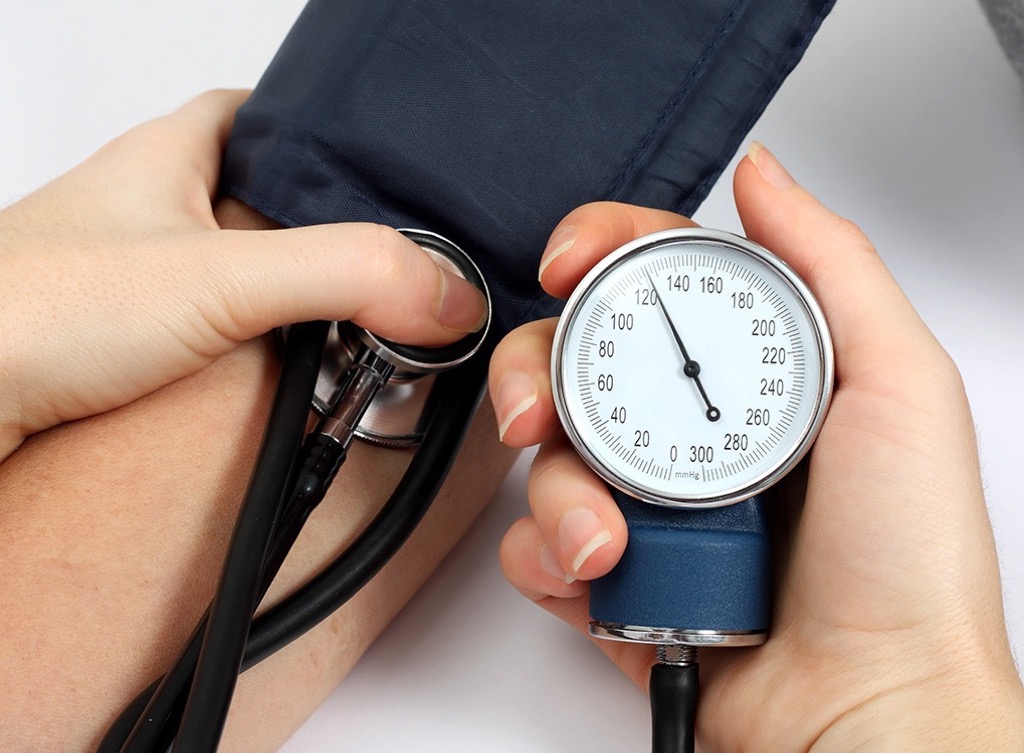
Your chance of developing high blood pressure increases as you age because of changes in your vascular systems. So, once you reach your 40s, it’s a good idea to ask your doctor how you’re doing. If you don’t keep your blood pressure in check through a healthy diet and lifestyle, the National Institute on Aging (NIA) says it could lead to stroke, heart disease, eye problems, and kidney failure, as well as other health issues.
Nesheiwat also recommends talking with your doctor about ways to keep your blood pressure in a healthy range: “[Avoid] smoking, watch your salt intake, avoid excessive alcohol, exercise, [and] manage stress,” she suggests.
5
“Is my heart healthy?”

It’s never too early to be looking out for your heart, and asking your doctor this simple question is a great place to start. According to the American Heart Association, data shows that risk factors for cardiovascular disease (including high blood pressure, high cholesterol, high body mass index, diabetes, and smoking) that are present in your 40s can predict your health later in life.
People who didn’t have any major risk factors in their 40s not only lived longer, but also lived more years without heart disease or chronic illnesses. So, even if you’re not concerned about heart problems now, taking care of yourself can help make sure it’s not a problem down the line.
6
“What can I do to preserve my hearing?”

If you’re over 40, it’s time to have a conversation with your doctor about your risk for hearing loss, even if it’s only a minor issue for you at the moment. In fact, attending to the issue now may prevent future cognitive decline: According to a 2014 review of research published in Aging & Mental Health, there’s a significant link between untreated hearing loss and the development of dementia.
7
“Does my family history factor into my health?”

When you were younger, you didn’t have to worry so much about your family history, especially if you were relatively healthy. But since many health issues, such as heart disease, cancer, and diabetes, have a tendency to run in families, you’ll want to start paying attention to it in your 40s. Ask your doctor this question in order to have a discussion about your family history. It’ll help him or her be better able to manage your health, whether that means doing more frequent screenings or putting an end to any risky lifestyle habits.
8
“Which screenings do I need?”

The types of tests you need (and the frequency with which you’ll get them done) will change as you age. Ask your doctor this question to find out exactly which screenings you should have done in order to stay on top of things. It might be something as simple as checking up on your blood pressure or cholesterol on a regular basis.
9
“How can I improve my gut health?”

Your gut health plays a bigger role in your overall health than you might think—which means you might want to ask your doctor to test your gut function. “These tests make sure your body is in an anti-inflammatory, anti-aging state,” says Maggie Berghoff, a family nurse practitioner. “You may need to see a functional or integrative practitioner for them, as they’re much more detailed than traditional bloodwork. Regardless, let them know your interest in this area so you can be guided in the right direction.”
10
“What can I do to maintain my vision?”

According to the National Health Interview Survey, more than 26.9 million Americans suffer from vision loss, and the percentage of those affected increases with age, which is why it’s important to talk to your doctor about how to maintain your eye health as you get older.
However, not everything you’ve heard about your eye health is true. “While vitamin A—think carrots—is key in maintenance of ocular health and eyesight, too many carrots will make you orange and too much vitamin A will produce increased intracranial pressure and may cause blindness,” says Howard R. Krauss, MD, surgical neuro-ophthalmologist at Providence Saint John’s Health Center.
Instead, Krauss recommends talking to your doctor and making sure your B-1 and B-12 levels are in a healthy range, as a deficiency in either can affect your vision.
11
“How should I treat my dry eye?”

Chronic dry eye is a frequent complaint for individuals as they age, but that doesn’t mean you have to keep suffering. In addition to using drops to help preserve the moisture in your eyes, you can try “omega-3 fatty acids and/or flaxseed supplementation,” says Krauss.
12
“Are my testosterone levels normal?”

It’s important for men to have their testosterone levels tested, especially after their 40th birthday has come and gone. Inna Lukyanovsky, PharmD, says symptoms of low testosterone can start small and quickly become serious. “Men with low testosterone could experience cardiovascular risks,” she says.
According to a 2017 study published in the Methodist DeBakey Cardiovascular Journal, low levels of testosterone may even increase the risk of developing coronary artery disease, metabolic syndrome, and type 2 diabetes.
13
“Am I at risk for tooth loss?”

If you want to keep your smile healthy and bright as you age, it’s important to discuss the possibility of tooth decay, loss, and periodontal disease with your dentist. According to the National Institute of Dental and Craniofacial Research, while adults between 20 and 34 years of age have an average of 26.9 teeth, that number drops to just 22.3 among adults between 50 and 64. Fortunately, the sooner you address those problems with your teeth, the sooner you can work toward preserving that smile.
14
“Do I need a cholesterol screening?”
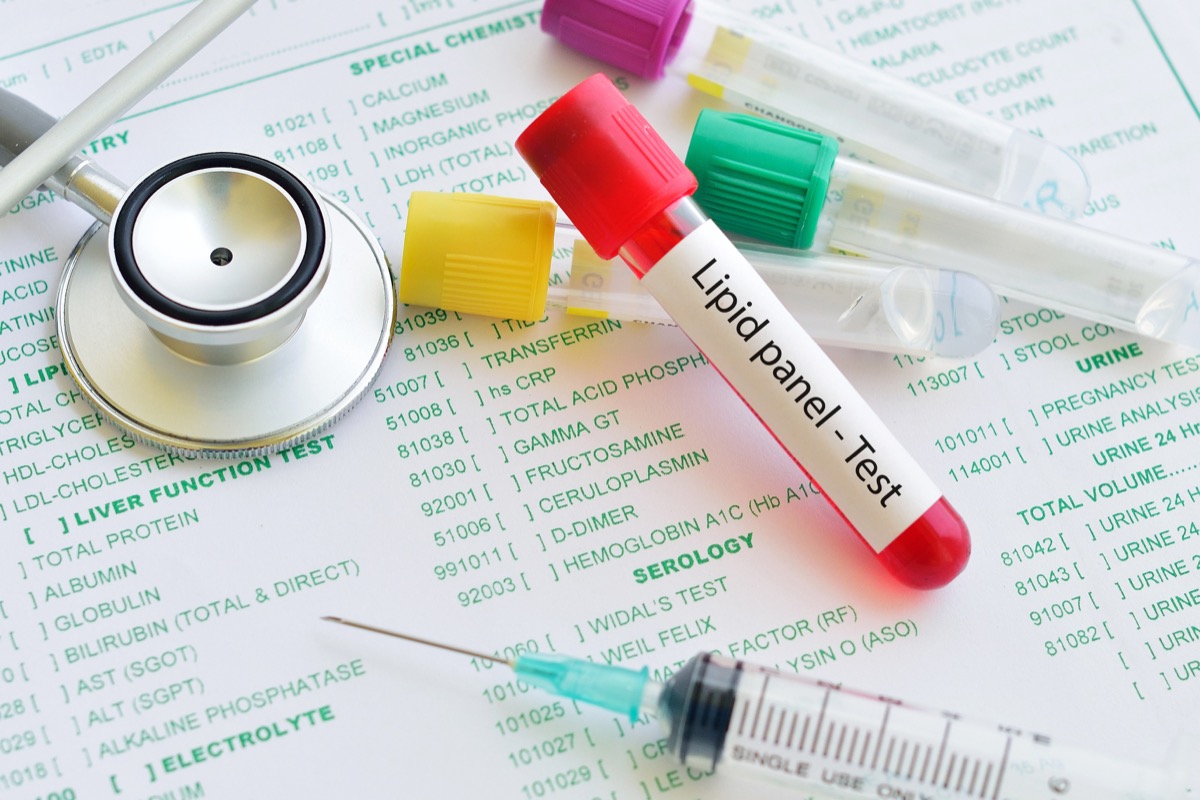
Dyslipidemia occurs when there’s an abnormally high amount of lipids—AKA cholesterol or fat—in the blood, often due to diet and lifestyle choices. Because it’s linked to heart disease and stroke—two of the top killers in the United States—it’s important to get your cholesterol levels tested.
The U.S. Preventive Services Task Force recommends men 35 and older have a screening for lipid disorders. If you’re already at an increased risk for coronary heart disease, it’s especially important for your health.
15
“What should my diet look like?”

Your diet plays a huge role in your health. By the time you enter your 40s, you may begin to experience health issues because of what you’ve been putting on your plate all these years. Ask your doctor what your diet should look like. If you need to control your blood sugar, you might be told to eat more fruits, veggies, and whole grains. And if you need to improve your cholesterol, you’ll probably be told to avoid foods high in unhealthy fats.
16
“Is my blood sugar in a healthy range?”

While only four percent of Americans between 18 and 44 have diabetes, that number dramatically increases throughout your 40s, according to the Centers for Disease Control and Prevention (CDC). For Americans 45 to 64, that rate goes up to 17 percent. Because of that, the American Diabetes Association recommends screening for type 2 diabetes every three years after the age of 45—and it’s essential to know your prediabetes status, too.
“If you have prediabetes, it’s important to take action now,” says Nesheiwat. “If not, then within 10 years you will develop diabetes—high blood sugar levels which can cause erectile dysfunction, heart attacks, blindness, kidney failure, strokes, numbness, and tingling in your feet, sometimes leading to amputation, fatigue, and more.” Many people living with diabetes don’t even know they have it, which can put their health and life at risk.
17
“What can I do about my slowing metabolism?”

If you’ve noticed your metabolism slowing down in your 40s, that’s normal. Experts say your metabolism declines every decade after early adulthood, which makes it harder to stay at a healthy weight. To ensure you still feel your best despite the changes your body is going through, your doctor can help recommend things you can do to battle your slowing metabolism, whether that’s eating a healthier diet or exercising more regularly.
18
“Do I weigh too much?”
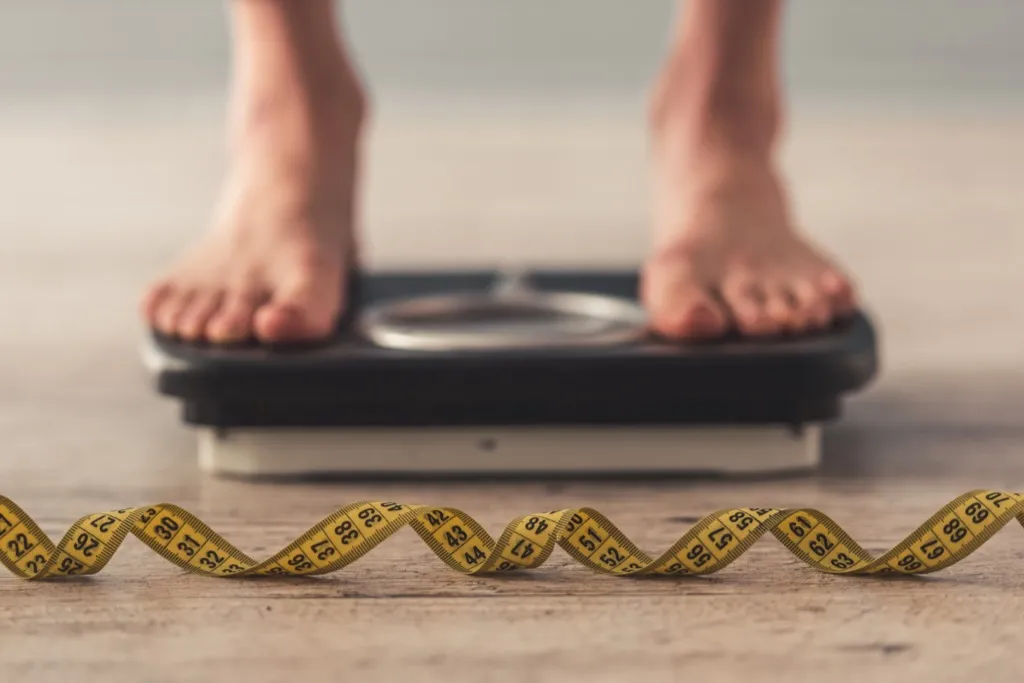
And speaking of those metabolic deficits, according to the CDC, nearly 40 percent of U.S. adults are obese. And while it’s never fun to ask if you weigh more than you should, asking about your weight is about so much more than vanity—it’s about your health. If you’re at an unhealthy weight, you could be at risk for life-threatening conditions like heart disease, stroke, type 2 diabetes, and even some types of cancer, so it’s always a smart topic to address.
19
“Why am I gaining weight?”

It isn’t just easier to gain weight in your 40s—it’s also harder to lose it if you do. Neither men nor women are safe from a slowed-down metabolism, an underactive thyroid, muscle loss, and being less active—all things that can affect the number on the scale. If a change in your weight is bothering you or becoming unhealthy, your doctor can give you a plan of action to combat the extra pounds. Sudden weight gain can also be a symptom of hormonal imbalances, kidney problems, or even heart failure, so it’s essential you ask your doctor if your weight keeps creeping upward.
20
“How often should I be screened for prostate cancer?”

Once you reach your 40s, it’s time to ask your doctor how often you need to be screened for prostate cancer—especially if you have a family history of the disease or are African American. Since one in nine men are diagnosed with prostate cancer during their lifetime, the Prostate Cancer Foundation says it’s recommended that every male get a baseline PSA (prostate-specific antigen), a test that identifies those who are at a higher risk.
21
“Should I take an STD test?”

Sexually transmitted diseases (STDs) are thought of as a young person’s problem. But the STD rate in older adults is also high—mostly because of not getting screened or treated, as well as a change in the immune system. “You can catch sexually transmitted infections at any age whether you’re 17 or 70,” says Nesheiwat.
According to Harvard Medical School, rates of chlamydia, gonorrhea, and syphilis are highest among older adults ages 45 to 54. Be sure to bring it up at your next appointment—especially if you’re dating and not using protection.
22
“Is my anxiety normal?”

The anxiety that occurs in your 40s isn’t uncommon. According to The Center for Treatment of Anxiety and Mood Disorders, midlife anxiety can come about for many different reasons, whether it’s related to your job, being unsatisfied with your relationship, or second-guessing the life decisions you made in your younger years. If you’re experiencing any symptoms of anxiety—including unexplained anger or annoyance, poor sleep, a change in your eating habits, or feeling trapped—it’s a good idea to bring it up to your doctor to see what can help.
23
“Do I need a colonoscopy?”
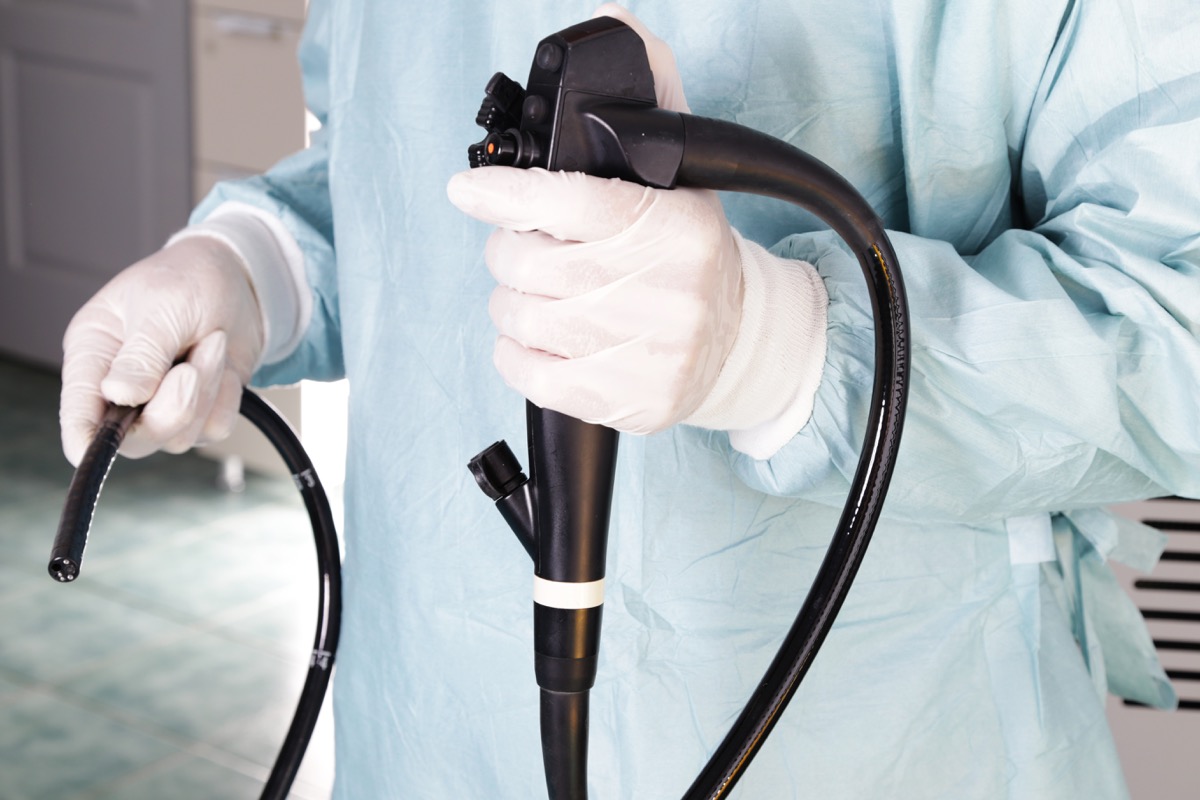
If you don’t have inflammatory bowel disease or a personal or family history of colorectal cancer, you’ll want to begin regular colonoscopy screenings at 45 years old, according to the American Cancer Society. (And if you do, you should start sooner—which is something your doctor will be able to help you with.) Sure, it’s no fun to have a colonoscopy, but for most people, it’s only recommended once every 10 years.
24
“Is my heartburn a problem?”

There’s nothing worse than experiencing a bad case of heartburn. And if you’ve dealt with the problem in the past, it will likely only become more frequent with age. According to the Cleveland Clinic, that’s due to the fact that your muscles weaken over time, including your lower esophageal sphincter, which controls the opening between your esophagus and stomach.
If you’d like to put an end to heartburn for good, your doctor can prescribe medication and give you suggestions on other life changes that can help as well, such as changing your sleeping position or adjusting your eating schedule.
25
“Do I have any nutrient deficiencies?”

The older you get, the more vulnerable you are to having nutritional deficiencies. According to the World Health Organization, aging affects your nutrient needs, and if you’re not meeting those, your health could suffer due to the long list of diseases that are affected by your diet. Getting blood work done can allow your doctor to see what you’re low in and make sure you stay your healthiest.
26
“What supplements should I be taking?”

Even if you eat a super-healthy diet, you might still need to take a supplement here and there to give your health a boost. Ask your doctor if there’s anything you’re lacking. Maybe you’re low in vitamin D or could use some antioxidants to help keep your immune system strong.
“The gold standard would be having your practitioner draw your nutrient levels to know what you may or may not need for your body,” says Berghoff. “You really shouldn’t follow a one-size-fits-all supplement plan, as our bodies all age differently and are biochemically unique.”
27
“What’s up with my sleep schedule?”

The National Sleep Foundation says it’s completely normal to go through sleep changes as you age, whether you suddenly have a harder time falling asleep or wake up more often throughout the night. Chat with your doctor about your sleep schedule and bring up any habits that are negatively affecting the amount you’re getting, like snoring, restless leg syndrome, or even stress and anxiety.
28
“Why am I experiencing more pain than usual?”

When you’re in your 20s, you can sleep on the floor without being even a little bit sore. Now, that’s not the case. If you’re concerned about experiencing more bodily pains than normal, ask your doctor about it. While the Cleveland Clinic says it’s totally normal to notice more aches and pains as you age, chronic pain should certainly be looked into to make sure it gets the attention it deserves and is properly managed.
29
“Should I cut down on alcohol?”

It’s still fine to have a drink or two as you get older. That being said, it’s also important to ask your doctor about your drinking habits to make sure you’re not overdoing things—especially because as you age, your ability to metabolize alcohol declines.
According to Harvard Medical School, even if you’re drinking the same amount of alcohol you used to, you’ll begin to have a higher blood alcohol concentration in your 40s and beyond. Because of these changes, you could feel more intoxicated with smaller amounts of alcohol, and that could put you in harm’s way.
30
“Do I need a bone density screening?”
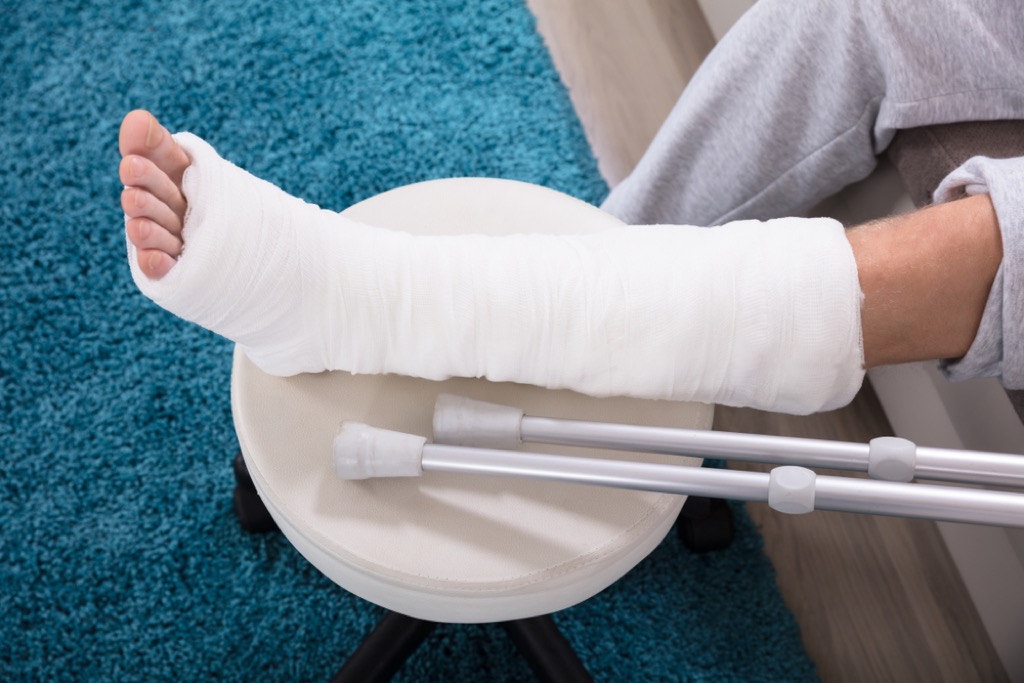
It might seem way too early to be concerned about your bones: You’re still in your 40s, after all. However, considering that men are twice as likely to die from a hip fracture as their female counterparts, it’s essential you know your bone health status sooner rather than later.
A bone density test can let you know how strong your bones are, especially if you have a family history of bone deterioration. The results can also help determine whether you should be doing anything differently with your diet to keep them sturdy.
31
“What’s this weird spot on my skin?”
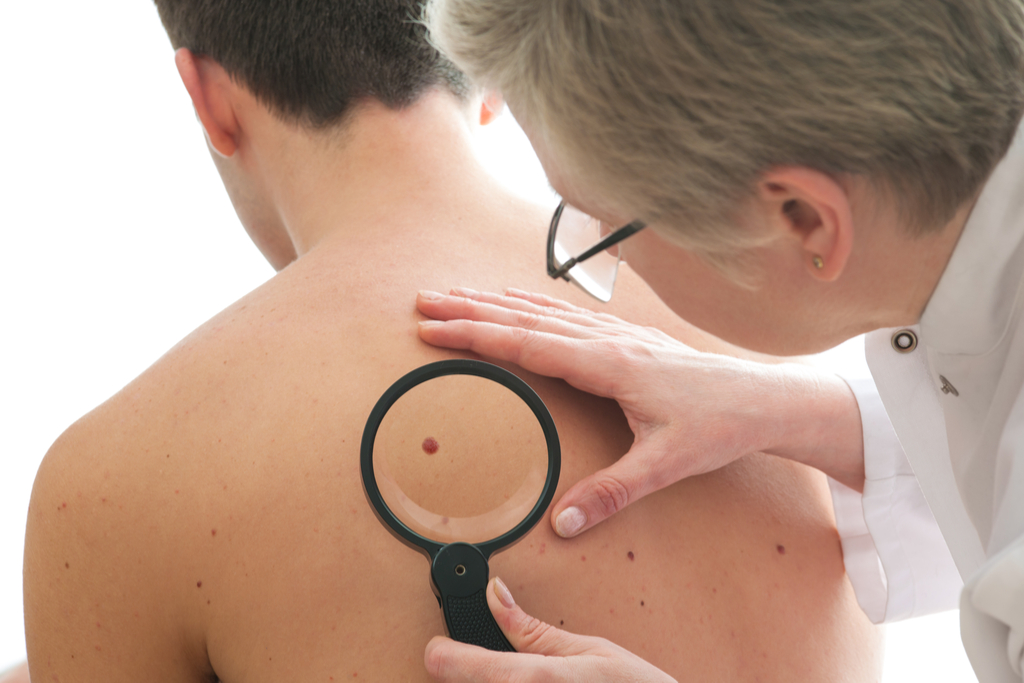
If you’re not paying attention to the health of your skin, now is the perfect time to start. That’s because, according to the Skin Cancer Foundation, more Americans are diagnosed with skin cancer every year than all other types of cancer combined. In addition, men ages 49 and under have a higher probability of developing melanoma than any other cancer. If you’ve had more than five sunburns in your lifetime, your risk of melanoma doubles, so there’s no reason not to get a full-body skin exam done regularly.
32
“What’s up with my decreased libido?”

Your sex drive can take a hit in your 40s. For men, it can be a result of natural aging or an underlying health condition like depression or stress, says the Mayo Clinic. Certain medications can also cause a decrease in your libido. If you’re experiencing any problems like this, there are plenty of options you can discuss with your doctor to ensure you feel like yourself again.
33
“Is there anything I can do about hair loss?”

Men usually expect hair loss as they age, and by age 40, there’s a good chance it’s already not as full as it used to be. In fact, by age 50, 85 percent of guys will have experienced some thinning, according to the American Hair Loss Association. If you’re noticing changes in your hair, it’s something you can bring up to your doctor.
34
“Why do I have to pee all the time?”

An overactive bladder can really get in the way of your day-to-day. According to the Urology Care Foundation, it becomes more of an issue as you age—30 percent of older men have an overactive bladder. This condition not only requires frequent bathroom trips during the day, but can also wake you up at night. So it’s a good idea to bring it up to your doctor to find out how to manage it before it starts interfering with your wellbeing.
35
“Are my vaccines up to date?”
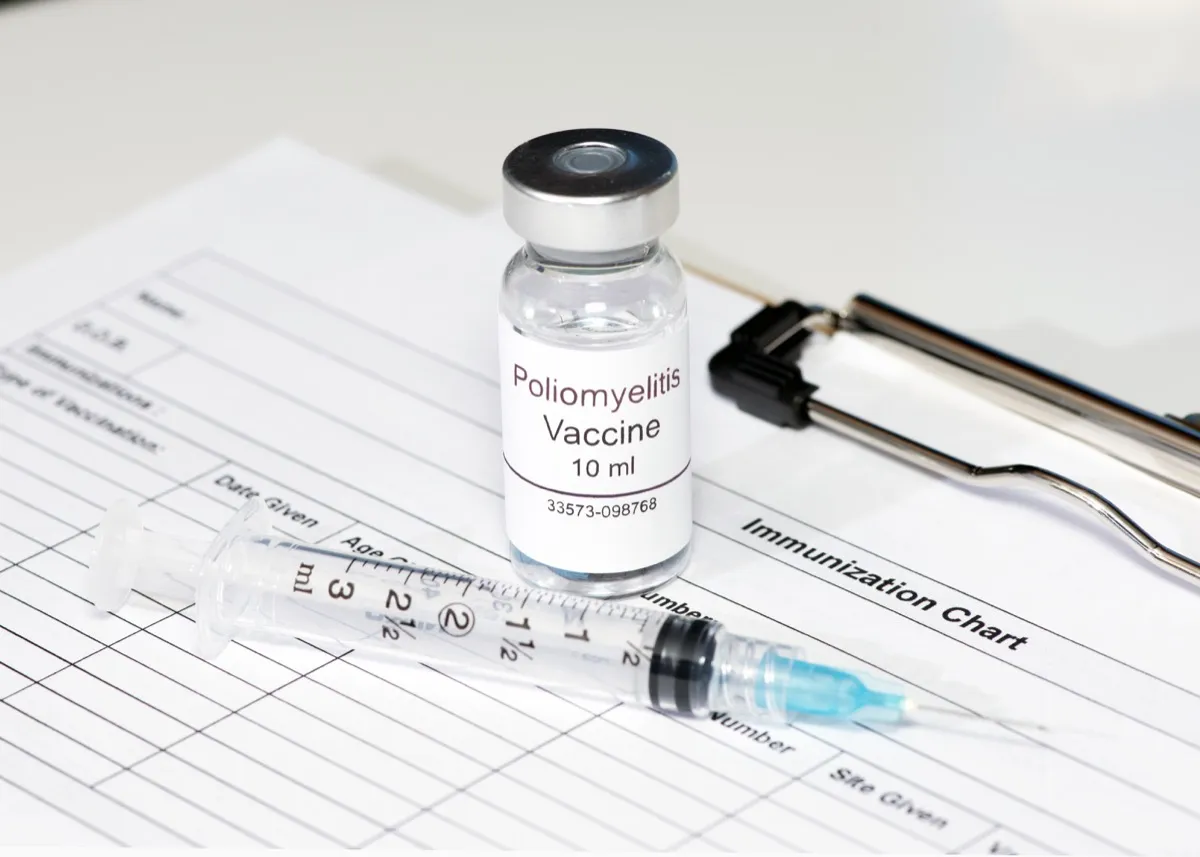
When you’re younger, it probably feels like you’re getting vaccinated all the time. It’s not something you can just ditch as you age, though. According to the CDC, adults 27 to 60 years old should be getting a yearly flu vaccine, have had a Tdap vaccine (which protects against whooping cough), and a Td booster shot (which covers tetanus and diphtheria) every 10 years. Check with your doctor to make sure all your shots are up to date to prevent any health problems.
36
“Should I be worried about food allergies?”

Most people assume if they didn’t have any food allergies as a kid, they never will. Unfortunately, that’s not the case. The Mayo Clinic says that while most allergies start in childhood, they can develop at any point during your lifetime. Sometimes, that means experiencing serious issues like anaphylaxis, facial swelling, hives, or trouble breathing, but it might also cause digestive problems. If certain foods start giving you trouble, your doctor can help find the culprit.
37
“Should I be worried about stress?”

Stress can take a toll at any age, and it’s especially something to be aware of in your 40s if you’re feeling the effects. You’re at a time in your life when you’re trying to juggle a lot: a crazy schedule, a relationship, kids, work… the list goes on and on. If you let your stress get the best of you, the Cleveland Clinic says it can negatively affect your health, resulting in headaches, elevated blood pressure, chest pain, and mental health issues like depression and anxiety. And for masterful ways to banish anxiety, check out these 30 Easy Ways to Fight Stress.
38
“Why am I experiencing inflammation?”
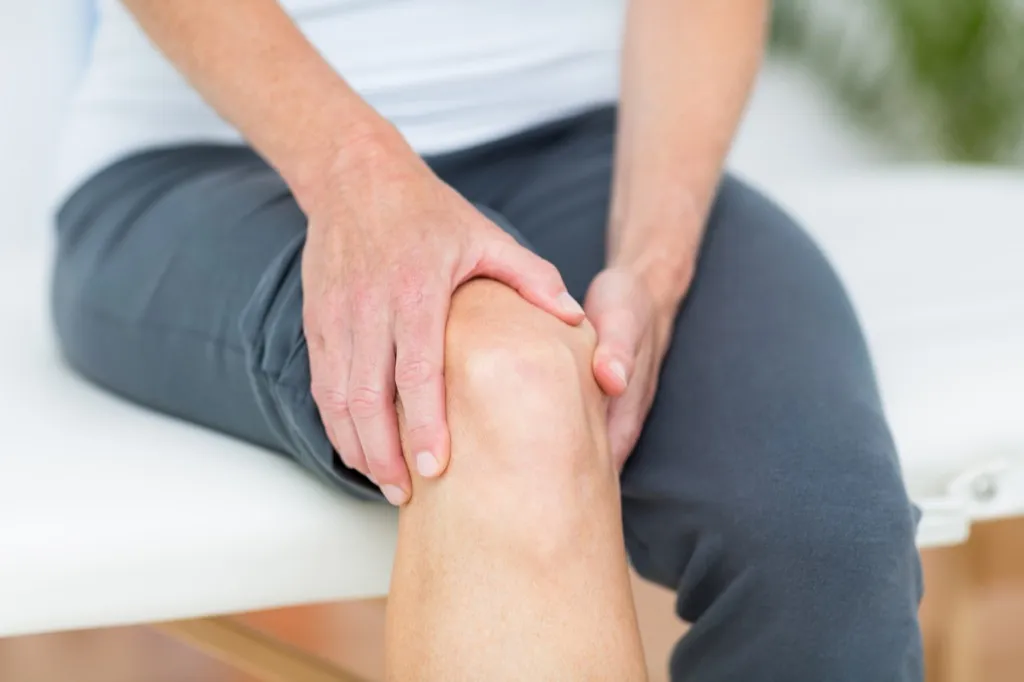
Inflammation is always something to be aware of—it’s essentially your immune system’s response to an irritant, whether external or internal. In some cases, inflammation can be helpful—like if you get a cut and your body is trying to heal it.
But in other cases, it can harm your health. Sometimes your immune system accidentally fights against your body’s cells, leading to issues like rheumatoid arthritis, psoriasis, and inflammatory bowel disease. That’s why if you’re experiencing inflammation, it’s smart to bring it to your doctor’s attention.
39
“Should I be concerned about my back pain?”

Back pain isn’t always just back pain. While it’s increasingly common to experience as you get older—especially due to normal wear and tear—it can also be a sign of an underlying condition, including infections, inflammatory diseases, tumors, and kidney stones, according to the National Institute of Neurological Disorders and Stroke. Ask your doctor about your back pain to get to the root of the cause. Even if it’s not something serious, he or she can help you manage your pain.
40
“How often should I be getting checkups?”

It’s hard to pinpoint exactly how often you should be going to the doctor, which is why it’s always best to ask. Generally speaking, most healthy people in their 40s should visit the doctor once every other year, according to Duke Health. “It’s important to see your doctor not just when you’re sick, but for your routine physicals to catch disease in its early stages,” says Nesheiwat.
If you require prescription medications or have any risk factors—including a family history of certain diseases, being a smoker, or being overweight—you’ll probably need to head to the doctor more frequently. If you broach the topic, your doctor will be able to help you come up with a personalized plan. And for more ways to help out with your health, here are 40 Things You Should Never Lie to Your Doctor About After 40.
To discover more amazing secrets about living your best life, click here to follow us on Instagram!